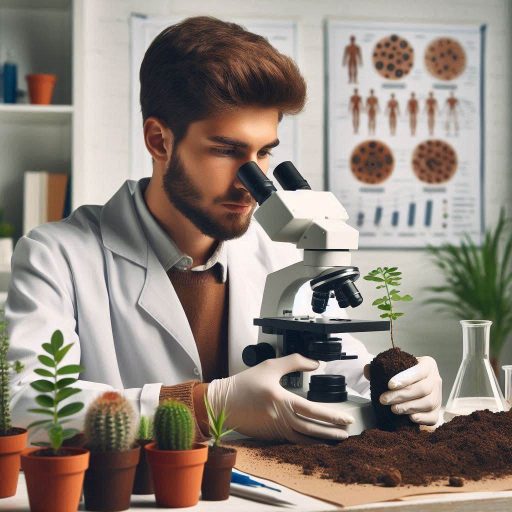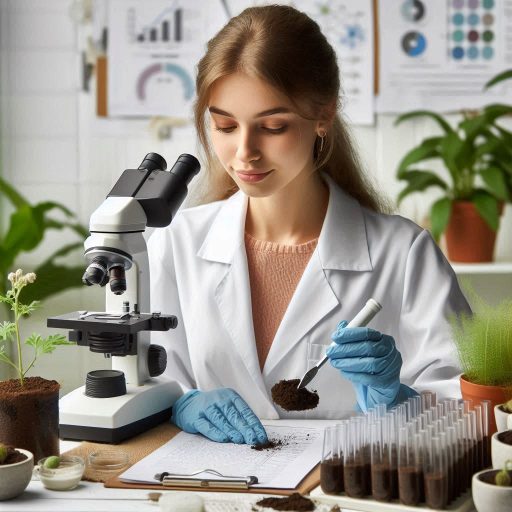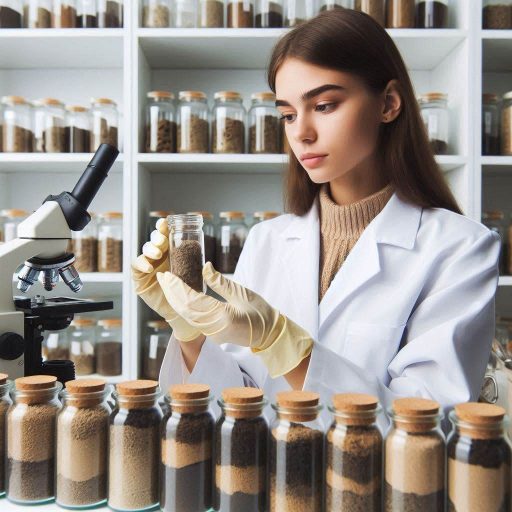Introduction
Soil scientists play a vital role in agriculture.
Their expertise ensures sustainable farming practices and enhances crop production.
These professionals analyze soil properties and health, which directly impacts agricultural outcomes.
They study the physical, chemical, and biological aspects of soil to provide essential insights.
Soil scientists assess nutrient availability and pH levels.
This information helps farmers optimize fertilizer use and improve crop yields.
They also focus on soil conservation practices, promoting methods that prevent erosion and maintain soil structure.
By implementing sustainable practices, soil scientists contribute to environmental protection.
In addition to soil analysis, soil scientists engage in research and innovation.
They develop new techniques to improve soil health, such as cover cropping and reduced tillage.
Their findings inform agricultural policies and practices, benefiting farmers and communities.
Soil scientists also collaborate with agronomists and farmers.
This teamwork leads to better crop management strategies and improved environmental stewardship.
By addressing challenges like climate change and soil degradation, soil scientists support the long-term viability of agriculture.
Soil scientists are crucial for advancing agricultural productivity.
Their knowledge and practices significantly enhance crop production while promoting sustainability.
Education and Training of Soil Scientists
Educational background and skills required to become a soil scientist
Soil scientists play a crucial role in agriculture, focusing on soil health and sustainability.
To become a soil scientist, individuals typically pursue a degree in soil science, environmental science, or a related field.
A strong foundation in biology, chemistry, and geology is essential for understanding soil composition and processes.
Many soil scientists earn a bachelor’s degree in soil science or agricultural science.
This degree provides knowledge about soil properties, management, and conservation practices.
Students also learn about soil classification and analysis techniques.
Some universities offer specialized programs focusing solely on soil science.
Advanced education can further enhance a soil scientist’s career.
Many professionals obtain a master’s or doctoral degree in soil science or a related discipline.
Graduate programs offer in-depth study of specific topics, such as soil microbiology, soil chemistry, and land management.
In addition to formal education, practical experience is vital.
Internships and research assistant positions during college help students gain hands-on experience.
Working in labs or field settings allows aspiring soil scientists to apply theoretical knowledge in real-world situations.
Soil scientists must also develop essential skills.
Strong analytical skills enable them to interpret complex data related to soil samples.
Effective communication skills help them convey findings to farmers, policymakers, and the public.
Soil scientists often work in interdisciplinary teams, requiring collaboration and teamwork skills.
Importance of ongoing training and professional development in this field
Ongoing training and professional development are crucial in this ever-evolving field.
Advances in technology and research methods continuously shape soil science.
Soil scientists must stay updated on the latest developments to remain effective in their roles.
Attending workshops, conferences, and seminars fosters professional growth and networking opportunities.
Certifications can enhance a soil scientist’s credentials.
Professional organizations, like the Soil Science Society of America, offer certifications.
These credentials demonstrate expertise and commitment to the field.
They also provide access to valuable resources and continuing education opportunities.
Continuing education is vital for adapting to new challenges.
Soil scientists often encounter emerging issues like climate change, soil degradation, and sustainability.
Ongoing training helps them develop innovative solutions to these pressing problems.
Becoming a soil scientist requires a strong educational background in soil science and related fields.
Practical experience and essential skills enhance their effectiveness.
Ongoing training and professional development ensure that soil scientists remain at the forefront of advancements in agriculture.
Their expertise significantly impacts soil health, crop production, and sustainable agricultural practices.
Read: Challenges and Rewards: The Dual Life of an U.S. Environmental Scientist
Soil Analysis and Testing
The process of soil analysis and testing conducted by soil scientists
Soil analysis and testing are crucial processes conducted by soil scientists.
These procedures help assess soil health and inform agricultural practices.
The process begins with soil sampling, where soil scientists collect soil from various locations.
They use tools like augers or soil probes to obtain representative samples.
Once collected, the samples undergo thorough testing in a laboratory.
Soil scientists analyze the physical, chemical, and biological properties of the soil.
Common tests include pH levels, nutrient content, organic matter, and texture analysis.
Each of these properties significantly influences soil health and productivity.
pH testing measures the acidity or alkalinity of the soil.
It affects nutrient availability to plants.
Soil scientists recommend amendments to adjust pH levels for optimal plant growth.
For example, lime can raise soil pH, while sulfur can lower it.
Nutrient analysis assesses essential elements such as nitrogen, phosphorus, and potassium.
These nutrients are vital for plant growth and development.
Soil scientists use this information to recommend fertilization strategies that meet crop needs.
Texture analysis determines the proportions of sand, silt, and clay in the soil.
Soil texture affects drainage, aeration, and water retention.
Understanding soil texture helps soil scientists advise farmers on appropriate crop selection and management practices.
Biological analysis evaluates the presence of microorganisms and organic matter.
Healthy soil contains diverse microbial populations that promote nutrient cycling.
Soil scientists encourage practices that enhance soil biology, such as cover cropping and reduced tillage.
After testing, soil scientists compile the results into a comprehensive report.
This report outlines the findings and provides recommendations for soil management.
Farmers and agronomists use this information to make informed decisions regarding crop management.
How this information is used to make informed decisions regarding crop management
Soil analysis guides decisions on crop rotation, fertilization, and irrigation practices.
For instance, if a soil test indicates nutrient deficiencies, farmers can adjust their fertilization plans.
Targeted applications of fertilizers help improve crop yields while minimizing environmental impact.
Soil analysis also assists in assessing soil health over time.
By conducting regular soil tests, farmers can monitor changes in soil properties.
This information helps them adapt their management practices to maintain soil health and productivity.
Additionally, soil testing can identify potential environmental concerns.
For example, high nutrient levels may indicate risks of runoff and water pollution.
Soil scientists can recommend best management practices to mitigate these risks.
The soil analysis and testing are vital for sustainable agriculture.
Soil scientists conduct comprehensive tests to evaluate soil health.
This information empowers farmers to make informed decisions regarding crop management, ultimately enhancing productivity and environmental sustainability.
Soil Conservation and Management
Role of soil scientists in promoting soil conservation practices
Soil scientists play a vital role in promoting soil conservation practices.
They study soil behavior and health, providing valuable insights for land management.
Their expertise helps identify practices that prevent soil degradation and enhance productivity.
One major area of focus is erosion control.
Soil scientists assess vulnerable areas at risk of erosion.
They recommend strategies such as planting cover crops or implementing contour farming.
These practices protect the soil surface and reduce erosion caused by wind and water.
Soil scientists also emphasize the importance of maintaining organic matter in the soil.
Organic matter improves soil structure, water retention, and nutrient availability.
They advocate for practices like reduced tillage and the use of compost to increase organic content.
These practices help restore degraded soils and promote healthy ecosystems.
Moreover, soil scientists conduct research on sustainable land management techniques.
They analyze the impact of various agricultural practices on soil health.
This research helps develop guidelines for sustainable farming practices that protect soil resources.
Soil scientists promote crop rotation as a key conservation strategy.
Rotating crops improves soil fertility and disrupts pest cycles.
By alternating crops, farmers can enhance soil health and reduce the need for chemical inputs.
Soil scientists also highlight the significance of agroforestry practices.
Integrating trees into agricultural landscapes can improve soil stability and biodiversity.
Trees help prevent erosion, enhance water retention, and provide habitat for beneficial organisms.
Furthermore, soil scientists advocate for the use of buffer strips.
These strips of vegetation along waterways filter pollutants and reduce runoff.
By implementing buffer zones, farmers can protect water quality while conserving soil.
How their recommendations help in sustainable agriculture and land use
Soil conservation practices recommended by soil scientists lead to sustainable agriculture.
Healthier soils contribute to improved crop yields and resilience.
By adopting these practices, farmers can maintain productivity without depleting natural resources.
Additionally, soil conservation enhances environmental quality.
Healthy soils store carbon, reducing greenhouse gas emissions.
Soil scientists promote practices that increase soil carbon sequestration, benefiting both agriculture and the climate.
Their recommendations also help combat soil salinization, a significant threat in arid regions.
Soil scientists advise on irrigation management techniques to prevent salt buildup.
They encourage practices like drip irrigation to optimize water use and minimize salinity issues.
Soil scientists also assist in land-use planning.
They evaluate soil properties to determine suitable uses for different areas.
Their expertise helps inform decisions about zoning, urban development, and conservation areas.
Soil scientists play a crucial role in promoting soil conservation and sustainable agriculture.
Their research and recommendations guide farmers toward practices that protect soil health.
By implementing these strategies, farmers can ensure the long-term viability of agriculture and land use.
Read: Job Market Trends: Future of Chemistry Jobs in America
Research and Innovation
The contribution of soil scientists in conducting research to improve soil health and fertility
Soil scientists significantly contribute to research focused on enhancing soil health and fertility.
They study soil properties, nutrient cycles, and biological interactions.
This research provides essential data for understanding how to optimize soil management practices.
One critical area of study is soil microbiology.
Soil scientists investigate the complex relationships between microorganisms and soil health.
Their research uncovers how these microorganisms contribute to nutrient cycling and disease suppression.
Understanding these interactions helps develop strategies to improve soil fertility.
Soil scientists also explore the effects of different agricultural practices on soil quality.
They conduct field experiments to evaluate practices like cover cropping and reduced tillage.
Their findings guide farmers in adopting methods that enhance soil structure and organic matter content.
Another vital contribution involves researching soil amendments.
Soil scientists assess the impact of organic and inorganic amendments on soil health.
They study how compost, biochar, and fertilizers influence soil properties.
This research helps identify the best practices for improving soil fertility.
Soil scientists also evaluate the role of water management in soil health.
They investigate how irrigation techniques affect soil moisture retention and nutrient availability.
Their research supports the development of efficient irrigation practices that promote sustainable agriculture.
How innovations in soil science have led to advancements in agricultural practices
Innovations in soil science have transformed agricultural practices worldwide.
Soil scientists develop new technologies for soil analysis and monitoring.
These innovations provide farmers with real-time data about soil health and nutrient levels.
One significant advancement is the use of precision agriculture tools.
Soil scientists utilize sensors and satellite imagery to assess soil conditions.
This technology allows farmers to apply fertilizers and amendments more accurately.
As a result, they optimize resource use and minimize environmental impacts.
Soil scientists also promote the adoption of digital soil mapping.
This innovative approach creates detailed soil maps that inform land management decisions.
These maps help farmers understand soil variability across their fields.
Consequently, farmers can implement tailored management practices that enhance productivity.
Research in soil conservation techniques has led to innovations in sustainable farming.
Soil scientists advocate for agroecological practices that improve soil health.
These practices include crop rotation, cover cropping, and agroforestry.
Implementing these strategies enhances soil structure and biodiversity while reducing erosion.
Furthermore, soil scientists investigate the potential of soil carbon sequestration.
They research methods to increase soil organic carbon storage.
These practices not only improve soil fertility but also mitigate climate change.
By enhancing soil carbon levels, farmers can contribute to reducing greenhouse gas emissions.
Finally, soil scientists actively engage in outreach and education.
They share research findings with farmers and agricultural stakeholders.
This knowledge transfer helps farmers adopt innovative practices that improve soil health and crop productivity.
Soil scientists play a crucial role in advancing agricultural practices through research and innovation.
Their contributions improve soil health, promote sustainable agriculture, and enhance food security.
As they continue to push the boundaries of soil science, the agricultural industry can adopt more effective and environmentally friendly practices.
Read: Challenges and Rewards: Navigating the Chemist Career Path

Collaboration with Farmers and Agronomists
The importance of collaboration between soil scientists, farmers, and agronomists
Collaboration between soil scientists, farmers, and agronomists plays a vital role in modern agriculture.
Each group brings unique expertise that enhances agricultural practices.
Soil scientists focus on soil health, farmers understand field conditions, and agronomists specialize in crop management.
Together, they create a well-rounded approach to sustainable agriculture.
Effective collaboration fosters the sharing of knowledge and resources.
Soil scientists provide farmers with critical insights into soil composition and fertility.
This information helps farmers make informed decisions about fertilization and crop rotation.
Agronomists bridge the gap between scientific research and practical applications on the farm.
They interpret soil data and recommend best practices.
Regular communication among these professionals is essential.
Weekly or monthly meetings can help share updates on research findings and agricultural techniques.
These interactions build trust and encourage ongoing partnerships.
Farmers feel more confident implementing recommendations from trusted soil scientists and agronomists.
Involving farmers in research projects is another critical aspect of collaboration.
Soil scientists can design studies that address farmers’ specific needs.
These projects yield valuable data on crop performance under various soil conditions.
Farmers provide real-world insights that enhance research relevance.
This collaborative approach ensures that research outcomes are practical and applicable.
How working together leads to better crop yields and environmental sustainability
Working together leads to improved crop yields and environmental sustainability.
When soil scientists and agronomists collaborate with farmers, they create customized solutions.
These solutions address specific challenges such as nutrient deficiencies and soil erosion.
For example, soil scientists analyze soil health and recommend tailored soil management practices.
Agronomists can then help farmers implement these practices effectively.
As a result, farmers experience increased crop yields due to healthier soils.
Improved soil fertility translates into higher productivity and better-quality crops.
Sustainable practices are another significant benefit of collaboration.
Soil scientists advocate for practices that enhance soil conservation.
These practices include cover cropping, reduced tillage, and organic amendments.
Agronomists support farmers in adopting these methods, which promote environmental sustainability.
Working together also helps manage resources more efficiently.
Collaborative efforts ensure that farmers use fertilizers and water wisely.
Soil scientists provide recommendations based on soil analysis.
Agronomists guide farmers on when and how to apply these inputs.
This approach minimizes waste and reduces the environmental impact of farming.
Additionally, collaboration promotes innovation in agricultural practices.
Soil scientists and agronomists can explore new technologies and techniques together.
This teamwork encourages farmers to adopt precision agriculture tools.
These tools enhance efficiency and improve crop management.
The collaboration between soil scientists, farmers, and agronomists is crucial for modern agriculture.
Their combined expertise leads to better crop yields and promotes environmental sustainability.
By working together, they can develop innovative solutions that benefit the agricultural industry and the environment.
This collaboration ultimately contributes to a more sustainable and productive future for agriculture.
Read: Diverse Career Paths: From Chemist to Patent Attorney in the US
Gain More Insights: Online Courses for Nanotechnology Enthusiasts
Impact on Food Security
Direct impact of soil scientists on ensuring food security through sustainable agricultural practices
Soil scientists play a critical role in ensuring food security worldwide.
They focus on sustainable agricultural practices that maintain soil health.
Healthy soil is essential for producing nutritious crops.
Soil scientists analyze soil conditions and recommend practices to optimize growth.
Their expertise helps farmers improve yields and reduce resource waste.
One key area of impact is soil conservation.
Soil scientists advocate for techniques that prevent erosion and nutrient loss.
They promote cover crops and crop rotation, which enhance soil structure.
These practices help maintain fertility and sustain agricultural productivity.
As a result, farmers can produce more food while using fewer resources.
Soil scientists also contribute to understanding soil fertility.
They conduct research on nutrient cycling and soil amendments.
This research informs farmers about effective fertilization strategies.
With better knowledge of soil needs, farmers can apply nutrients more efficiently.
This efficiency reduces environmental impact while maximizing crop yields.
In addition, soil scientists address challenges posed by climate change.
They study how changing weather patterns affect soil health.
By understanding these effects, they can develop adaptive strategies.
Farmers can implement these strategies to ensure stable food production in uncertain conditions.
How their work influences global food production and distribution
The work of soil scientists significantly influences global food production and distribution.
Their research underpins the development of sustainable practices that enhance productivity.
Increased productivity leads to greater food availability in local and global markets.
Soil scientists also collaborate with international organizations.
These partnerships aim to implement sustainable practices worldwide.
By sharing knowledge and techniques, they promote food security on a global scale.
Their efforts help countries struggling with agricultural challenges to improve food production.
Moreover, soil scientists contribute to policies that support sustainable agriculture.
They provide evidence-based recommendations to policymakers.
These recommendations help shape regulations that promote responsible land use.
Effective policies encourage farmers to adopt sustainable practices.
This adoption leads to improved soil health and food security.
Soil scientists also focus on enhancing food distribution networks.
They identify areas with soil degradation and low productivity.
This identification helps prioritize resources for improving agricultural practices.
By enhancing local food production, they contribute to reducing food deserts.
Furthermore, soil scientists support initiatives that aim for equitable food distribution.
They work with communities to educate farmers about sustainable practices.
This education empowers farmers to improve their yields and income.
Higher incomes enable farmers to participate in local markets, promoting food accessibility.
Soil scientists are crucial to ensuring food security through sustainable agricultural practices.
Their research, advocacy, and collaborations directly impact global food production and distribution.
By promoting soil health and sustainable farming methods, they contribute to a more secure food future for everyone.
Their work is vital for meeting the growing global demand for food while preserving our planet’s resources.
Discover More: Seismologist Work Environment: Field vs. Lab
Explore Further: How Space Science Advances Environmental Studies
Transform Your Career Today
Unlock a personalized career strategy that drives real results. Get tailored advice and a roadmap designed just for you.
Start NowPolicy Influence and Advocacy
How soil scientists play a role in shaping agricultural policies and regulations
Soil scientists significantly influence agricultural policies and regulations.
They provide essential data and insights on soil health.
Policymakers rely on their expertise to create effective agricultural strategies.
By presenting research findings, soil scientists help shape national and regional policies.
Their work informs decisions about land management and agricultural practices.
Soil scientists participate in policy discussions at various levels.
They engage with government agencies, NGOs, and agricultural organizations.
These collaborations ensure that scientific knowledge informs policy development.
Their involvement promotes evidence-based policies that support sustainable agriculture.
Moreover, soil scientists contribute to the formulation of environmental regulations.
They assess the impact of agricultural practices on soil and water quality.
This assessment helps identify practices that lead to degradation.
Their research highlights the need for regulations that protect natural resources.
Consequently, policymakers implement laws to promote responsible land use.
Soil scientists also advocate for funding dedicated to soil research.
They emphasize the importance of investing in sustainable agricultural practices.
This funding enables further research and development of innovative solutions.
Increased funding leads to improved practices that benefit farmers and the environment.
Their advocacy for sustainable agricultural practices and environmental protection
Soil scientists advocate for sustainable agricultural practices vigorously.
They promote practices that enhance soil health and biodiversity.
These practices include crop rotation, cover cropping, and reduced tillage.
Such methods improve soil structure and nutrient availability.
Additionally, soil scientists work to raise awareness about soil conservation.
They educate farmers and the public about the importance of healthy soil.
By conducting workshops and outreach programs, they share best practices.
This education empowers farmers to adopt sustainable methods.
Soil scientists also collaborate with environmental organizations.
They support initiatives aimed at protecting ecosystems and biodiversity.
Their research often addresses the intersection of agriculture and environmental conservation.
This collaboration promotes policies that balance agricultural productivity and environmental health.
Furthermore, soil scientists engage in public advocacy efforts.
They communicate the importance of soil health to broader audiences.
By participating in conferences and seminars, they share their findings.
Their advocacy highlights the critical role of soil in food security and environmental sustainability.
Soil scientists also influence educational curricula related to agriculture.
They advocate for integrating soil science into agricultural education programs.
This integration ensures future generations understand soil health’s significance.
It prepares them to address future agricultural challenges.
Soil scientists play a vital role in shaping agricultural policies and advocating for sustainable practices.
Their expertise informs regulations that protect soil health and promote responsible land use.
Through education, collaboration, and public advocacy, they raise awareness about the importance of soil conservation.
Their efforts contribute to a more sustainable agricultural future, benefiting farmers and the environment alike.
By influencing policies and practices, soil scientists help ensure that agriculture remains viable for generations to come.
Conclusion
This blog post highlights the significant contributions of soil scientists to agriculture.
They play a vital role in enhancing food production and promoting environmental sustainability.
First, we discussed the educational background and skills necessary to become a soil scientist.
Ongoing training and professional development remain essential in this ever-evolving field.
Next, we explored the process of soil analysis and testing.
Soil scientists analyze samples to inform crop management decisions.
Their recommendations help promote sustainable agricultural practices and soil conservation.
We then highlighted the contributions of soil scientists to research and innovation.
Their work leads to improved soil health and advancements in agricultural techniques.
Furthermore, we emphasized the importance of collaboration among soil scientists, farmers, and agronomists.
This teamwork enhances crop yields and supports environmental sustainability.
We also discussed how soil scientists influence food security through sustainable practices.
Finally, we examined their role in shaping agricultural policies and advocating for environmental protection.
Soil scientists are essential for advancing agriculture.
Their expertise directly impacts food production and environmental health.
By promoting sustainable practices and influencing policies, soil scientists help ensure a secure and sustainable agricultural future.
Their work is crucial for addressing global challenges in agriculture and environmental conservation.
[E-Books for Sale]
The Big Book of 500 High-Paying Jobs in America: Unlock Your Earning Potential
$19.99 • 500 High-Paying Jobs • 330 pages
Explore 500 high-paying jobs in America and learn how to boost your career, earn more, and achieve success!
See All 500 High-Paying Jobs of this E-Book
1001 Professions Without a Degree: High-Paying American Jobs You Can Start Now
$19.99 • 1001 Professions Without a Degree • 174 pages
Discover 1001 high-paying jobs without a degree! Unlock career tips, skills, and success strategies for just $19.99!




